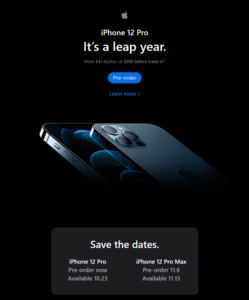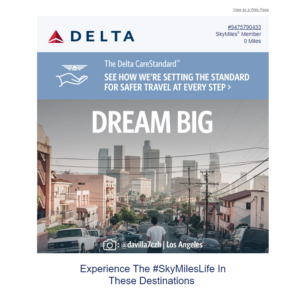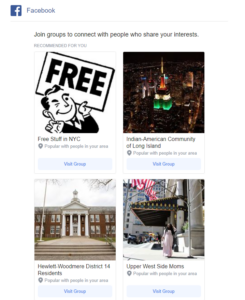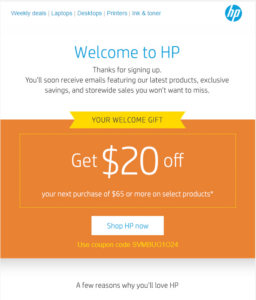As technology continues to advance, so does a customer’s expectations. As most of them are accustomed to overflowing inboxes filled with offers from their favorite brands, they expect more from the emails they receive. So, how can you still use email marketing to stand out from the crowd?
A successful email marketing strategy will encourage signups to your product, generate website traffic, and improve your ROI. This is supported by research, which shows that for every $1 you spend on email marketing, you can expect an average return of $42. Many Fortune 500 companies, such as UPS and Facebook, continue to capitalize on this power of email marketing. In this post, we will go through the top 6 email marketing lessons you can learn from the Fortune 500 companies to improve your email conversion rate.
Also Read: The Green Shoots of a Digital Publishing Revival Call for Creative New Formats
Apple: Focus your Unique Value Proposition and Keep It Simple
Apple is one of the few successful companies that don’t need to compete on price. Instead, their marketing focuses on promoting an innovative product that its competitors cannot imagine or offer.
In this pre-order email, you can see that Apple justifies not competing on price as its benefits speak for itself. Who wouldn’t want a smartphone with the fastest chip or one that possesses new technology for taking portraits at night?
What Apple also does very well, as part of its email marketing, is to describe high tech products without the high tech jargon. Their sentences are short and direct so that it doesn’t overwhelm a consumer with too much information. Their product images and simple color schemes also make it easier for consumers to understand what they are reading. Apple also uses white space between images and words so that customers can quickly scan the content of an email. In this way, an uncluttered design framework gives Apple’s consumers a better customer experience.

Ford: Instil an emotional connection
As Ford is a family-led business, their email marketing focuses on values such as diversity, inclusiveness, adventure, and community when marketing its products.
The sub-heading of this email ‘We’re Better Together’ makes you feel that you’re helping build a better country or world when you buy a Ford car. This email also makes you believe that a Ford car is more than just a car; it’s an experience that was created for you over decades so that you can have your adventures in life.
Ford’s email marketing also creates an emotional bond with its customers through its charity initiatives like ‘Drive 4 Ur school’, which has made a difference to a school’s arts program. The shocked image of the student used before the heading ‘A little drive goes a long way’ in this email shows how human this brand is and encourages you to click on the call-to-action (CTA) ‘Watch Now.’
Microsoft: Craft a fear of missing out (FOMO) sequence for new products/features
When Microsoft’s Surface Laptop Go and Surface Pro X products were ready, they started to build the hype with a FOMO email sequence before its release on October 13, 2020.
On October 8, you are given a final opportunity to pre-order either of these two products so you could get it on October 13, 2020. Then, if you were still unsure about buying, Microsoft persuades you to watch the first episode of their Microsoft Insider series with an incentive. These incentives are winning a Surface device or a $75 Microsoft store gift card. This Insider Series also made buying a new product an interactive experience for the customer and lists the benefits of the new product in a video format.
Like Apple, Microsoft also does not compete on price and instead creates FOMO through amazing deals associated with its product. After the release date of the new products, Microsoft still creates demand for the Surface Pro product through its hashtag of #MadewithMicrosoft. By showing how other artists have benefited from their Surface Pro products, Microsoft’s letting their customers sell the product for them. While there are many CTA’s you can click on in this email, the message is clear; the Surface Pro is a fantastic product you need in your life.
UPS and Delta Air Airlines: Put people’s needs and desires first
It is very easy to focus on business goals during Covid-19. Fortune 500 companies like UPS deserve a lot of credit for opting for a customer-centric email marketing strategy that tells customers that they can still ‘triumph’ in unprecedented times.
This free webinar email from UPS shows customers that the brand cares more about them rather than profits. The invaluable training in this email above is being delivered by not one but three salespeople who want to help your business adapt to any market conditions. By putting their customer’s needs first, UPS has given away real value for free. The image used in the beginning also emotionally appeals to the subscriber who wants to get success even in challenging times.
If you need to travel when travel is restricted, you want to know that you’ll be safe. Delta Air Airlines does this and more by showing you that it is possible to still dream big during Covid-19. This email newsletter makes you want to travel through its user-generated content showing you that traveling is not just the byproduct of dreams. In this way, Delta Air Airlines can convince a future customer to go on a trip as normal as others have been there and enjoyed the sights. Following this, the email then also goes through the steps of how it is making it easier for you to fly, whether through flexible booking options or blocking a selection of seats in the middle of the aircraft.

Disney and Facebook: Using Customer Insights To Create Email Marketing Content
Disney gives subscribers what they want by using their past viewing habits to determine their future online behavior. For example, in this email, Disney highlights the season premieres of family comedies for this viewer based on what they have watched before. While there are other current ABC comedies available like Mixed-ish and American Housewife, Disney has sent a targeted email to this customer to encourage them to continue watching their favorite shows. As this type of customer likes comedies, they are also more likely to open an email with a subject line that refers to comedies.

Similarly, Facebook also uses email to persuade subscribers to connect with individuals who have shared interests. In this email, Facebook has recommended groups that they feel a subscriber will like based on their past behavior. If a user then opts for Facebook’s recommendations, Facebook can gather further insights to inform future email marketing strategy.
Also Read: How to Make Connections in an Online World
HP: Make Customers Feel Welcome As Soon As They Sign Up

HP knows that customer retention does not occur naturally. So it grabs the attention of its customer immediately with $20 off future products just for signing up for their email newsletter. The emphasis is on the offer, and to push you towards a purchase, HP also reminds you of its benefits with just three simple points. These points are not here by accident but show that HP addresses its customer’s pain points of shipping, support, and privacy so that they find it easier to buy.
Key Takeaways
Successful email marketing is dependent on a business’s creativity, data-driven customer insights, and innovation. All of these Fortune 500 brands have demonstrated that they understand that email marketing is all about meeting customer expectations so that they can ensure that subscribers will always engage and convert. Learn from these examples so that you can craft your own customer-centric email marketing strategy.


